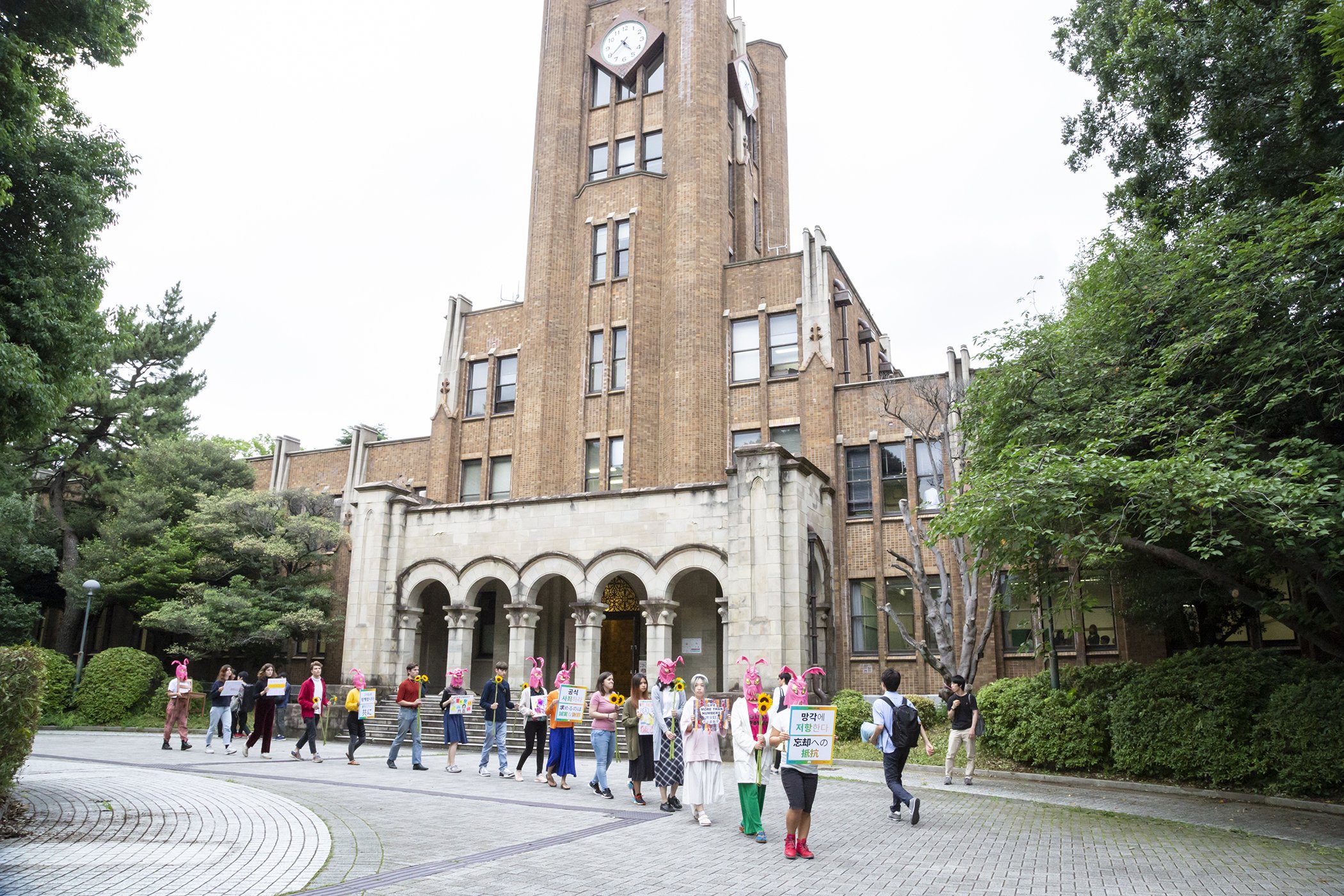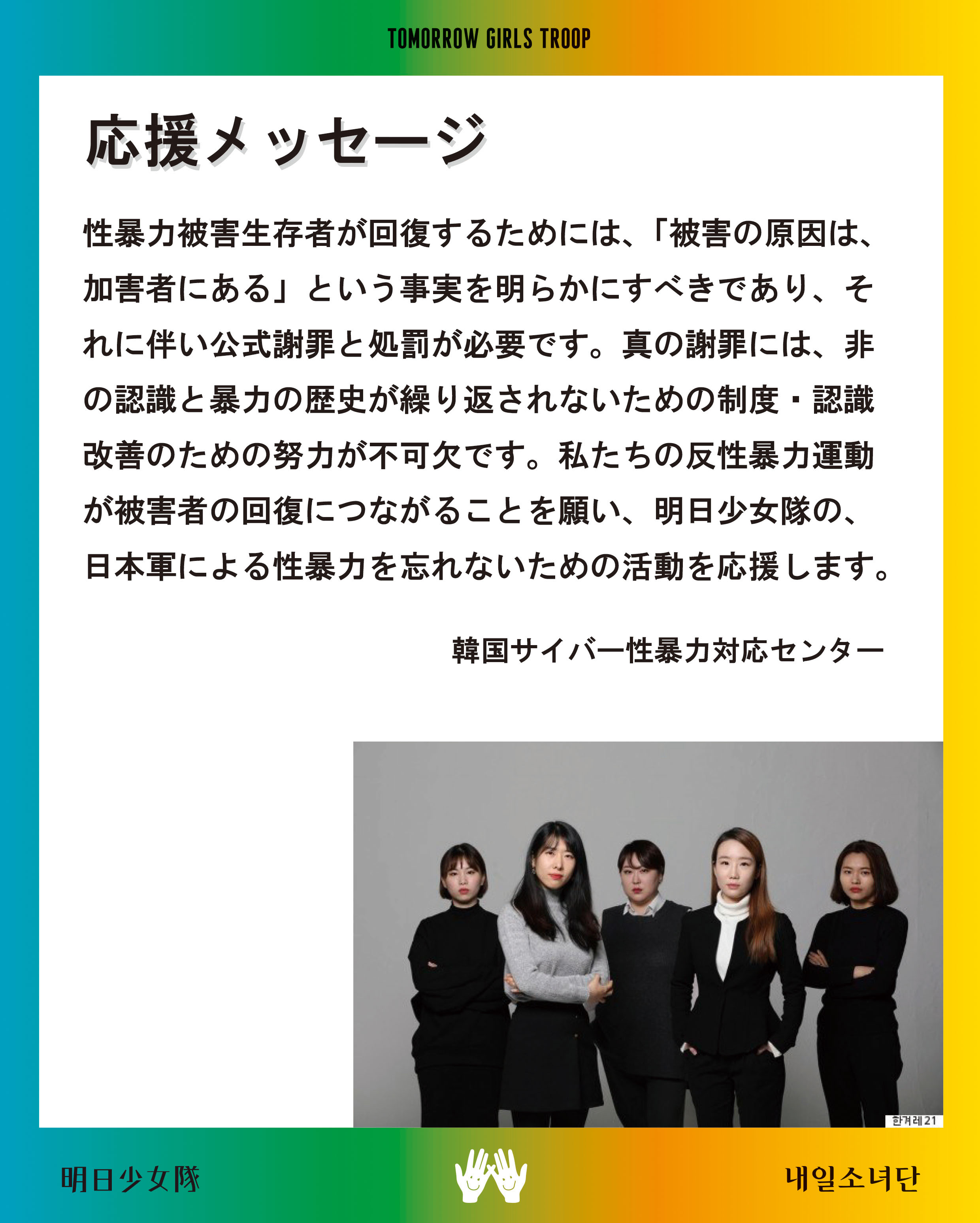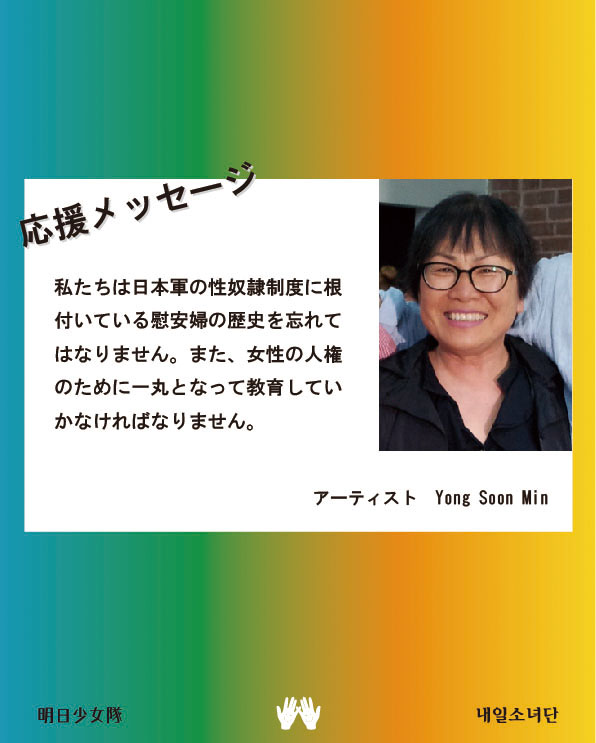글: 내일소녀단 김명순
<Against Forgetting> by Tomorrow Girls Troop commemorates Japanese victims of Japanese sexual slavery during WWII together with Korean victims, to seek possibilities of women’s solidarity beyond the borders of nation-states.
““We see a deep connection between the repetitive burial of history into oblivion and our society’s attitude which often erases the voices of victims of sexual violence. We aim to disobey such power that silences stories and voices of survivors.””
Our project not only covers individually conducted performances but also includes the production and distribution of the documentation, and activities to spread awareness on the issue in Japan.
The performance has been conducted in Seoul, Tokyo and Glendale LA. The stories and history of the cities where each performance takes place plays an important role in the context of the understanding surrounding the issue, and each performance has been modified specific to the site. The location, composition and choreography of the work were all accordingly modified as well as the contextual emphasis and methodologies in the approach.
We are writing here about the performance that took place in Tokyo
Performance in Tokyo
In Japan, there are few opportunities for in-depth study of the "comfort women" issue. Moreover, coverage of the "comfort women" issue often leads to nationalistic debates. Internet searches are flooded with information attempting to erase the voices of the women involved, influenced by the revisionists. Although many young feminists are interested in learning about the "comfort women'' issue, they have difficulties in accessing reliable information. Therefore, we made the effort to provide opportunities in Tokyo, where beginners can learn about the "comfort women" issue, alongside the performance.
In 2019, we held a Japanese and Korean gathering and educational event at AIT (Arts Initiative Tokyo) in Daikanyama. We also created and distributed a pamphlet titled "What is 'Comfort Women'?" (「いあんふって何?」), which explains the issue in a comic format, in collaboration with the feminist magazine Palette.
Image of the pamphlet.
At the performance
Executing the performance safely in Tokyo itself was a challenge. We were concerned if the performance could take place without threats from the right-wing or interference from the police. Fortunately, our collaborator Yoshiko Shimada, who teaches the course "Art and Feminism in Post-war Japan" at the University of Tokyo, invited us to perform during her class. Due to censorship concerns, the performance was carried out with a short notice only provided to our supporters of crowdfunding.
The performers consisted of members of Tomorrow Girls Troop, students from the class, and women recruited from the crowdfunding website. The group was composed of young individuals from various nationalities who were interested in the comfort women issue, as well as Japanese women who traveled by overnight buses from other regions such as Kyoto and Aomori.
There were significant differences in the form of the Tokyo performance compared to the ones we conducted in Seoul or Glendale. Firstly, in Japan, the absence of a "Girl Statue" led to the use of an empty chair in a similar form to symbolize the lack of recognition for the victims and their presences. Regarding the contextual difference, Yoshiko Shimada did not directly participate in the performance in her Comfort Woman Statue costume, but rather was involved in the overall planning, such as providing the site for the performance.
The participating students created placards in various languages that represented messages of solidarity for "comfort women" victims, based on their respective home countries. These placards, along with ones made by Tomorrow Girls Troop containing messages in Korean and Japanese, were utilized in the performance.
Placards made by the students.
The performance began under a large tree on campus then led to walking on campus for 15 minutes until returning to the starting point. While the performers marched through the campus, the remaining participants distributed the “comfort women” educational pamphlets to passersby.
As the performance was coming to an end, campus officials approached and inquired about the responsibility for the performance and pamphlet distribution. Despite the tense moment, the situation was resolved without major issues. We have no regrets about the course of action taken, because we believe the performance would have been nearly impossible if we attempted to seek permission, especially regarding the sensitivity of the issue.
A few weeks after our performance, the "Freedom of Expression" exhibition at Aichi Triennale was shut down due to threats from the far-right who were against the inclusion of the "Statue of Peace" (Girl Statue). This incident occurred shortly after the exhibition opened. Consequently, many participating artists chose to boycott the event. As a result, an online movement “Being a Statue of Non Freedom of Expression” emerged, where individuals posted pictures of themselves sitting in chairs similar to the “Girl Statue” with a hashtag #AichiTrienalle, “NonFreedomofExpression. Tomorrow Girls Troop shared and archived these photos on our social media accounts.
Censorship of the Statue of Peace and “comfort women” is not merely a nationalistic issue between Japan and Korea.
With the rise of the #MeToo movement in Japan, the younger generation has become more aware of the issue of sexual violence. Many young individuals have begun questioning the society where rape cases or sexual abuse result in innocent verdicts. They are realizing that the culture of sexual violence is not a problem of the past alone, but persists today. Creating opportunities for the younger generation to learn about the past instances of sexual violence is crucial in building a society free from such atrocities.
Additionally, by not forgetting the past, both South Korea and Japan can work together to open a brighter future.
Tomorrow Girls Troop’s performance attempts to remember the tragedies of the past, stand in solidarity with survivors of sexual violence, and oppose the ongoing global issue of sexual violence.












